Makah Whale Hunt Sparks Death Threats, Obscenities, Prompts Call for Tolerance
- Share via
SEATTLE — Death threats, obscene telephone calls and racist venom in response to the Makah Indian Tribe’s first whale hunt in decades have shocked religious leaders here, who called for tolerance and respect.
“The issue is one that really touches on religious freedom,” said Nancy Vineberg, executive director of the American Jewish Committee’s local office and a member of the multidenominational Church Council of Greater Seattle.
“Being a country founded by people fleeing religious persecution . . . I think we need to accord the Indian nations at least that amount of respect,” Vineberg said Thursday.
Protesters at the Seattle Federal Building held a candlelight vigil Monday--the day the Makah killed a whale--with protest signs bearing such messages as “Save the whales, kill a Makah.”
“We live in Seattle--a city named for an Indian chief . . . and we have so little respect for the people who were here” when Europeans arrived, Vineberg said.
Protesters in the Neah Bay area near the Makah reservation have decried racism, but say it would be racist not to oppose a hunt by Indians when they oppose whaling by others.
“When it gets into the race issue, I don’t support that at all,” said Kenny Clark at the Oregon-based anti-whaling group Sea Defense Alliance’s headquarters at Sekiu, about 20 miles east of Neah Bay.
“I don’t see it as a race issue. It’s about an animal that people feel very passionate about, and people are just angry,” Clark said.
“The religious aspect I really don’t think most people are taking into account,” he said, adding he was angry at the Makah “not for their religious beliefs, I’m angry at them for basically making a trophy out of this animal they killed.”
Much of the backlash voiced on talk radio dealt with what people said were contradictions between the lives Indians lead today and ancient traditions, Vineberg said.
“It struck me you could say this about any religious group in this country,” she said. “We hold onto our religious traditions because they give our lives meaning.”
Many were upset by television footage of the kill, Vineberg noted.
“I’m sure if we watched deer hunting live, or the slaughtering of beef live,” many people might swear off meat, she said.
Anti-whaling groups have complained that the tribe was not properly reverent when the 30-foot whale was pulled ashore at Neah Bay. The Makah had asked media crews to respect their privacy during religious ceremonies and prayers, which were not televised.
Misunderstanding about Indian culture is an ongoing problem, said Janine Bowechop, executive director of the Makah museum.
“We get it all the time--’I thought you people respected the earth and its inhabitants.’ I don’t know of any Native Americans that have been vegetarians,” she said.
For thousands of years, whales have been central to Makah culture. The Makah consider the relationship to be one of mutual respect, and honor the whales for their sacrifice, she said.
“The songs and ceremonies are centuries old,” she said. “It’s difficult to articulate--it’s difficult that we even have to articulate why this means so much.”
Makah officials say the tribe at the tip of Washington’s Olympic Peninsula has received hundreds of threatening calls. On the Internet, a Web site made to look like the official Makah site was posted, but with anti-whaling and anti-Makah words and pictures.
The Makah are guaranteed whaling rights under their 1855 treaty--the only Indian treaty to contain such a provision. Some opponents suggest such treaties are outdated and should be scrapped.
“I don’t know what to say to those people,” Bowechop said. “The Bill of Rights was authored a long time ago, and so was the Constitution.”
More to Read
Sign up for Essential California
The most important California stories and recommendations in your inbox every morning.
You may occasionally receive promotional content from the Los Angeles Times.













